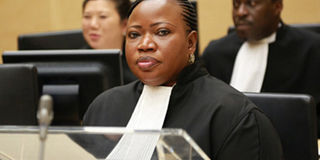ICC rejects Prosecutor's bid to amend charges against William Ruto

ICC Prosecutor Fatou Bensouda. The International Criminal Court has dismissed an appeal by Prosecutor Fatou Bensouda to amend charges against Deputy President William Ruto and Joshua arap Sang to include crimes committed before January 2008. Photo/FILE
What you need to know:
- The five Appeals Chamber bench judges were categorical that it would go against Mr Ruto’s rights before the court if they were to allow the prosecutor to amend the period within which the charges were committed as stated in the document containing charges.
- The judges ruled that if Ms Bensouda was out to amend the charges, she should have asked the Trial Chamber to postpone the trial until her appeal was concluded.
Deputy President William Ruto will not be tried over crimes against humanity which were committed in and around Eldoret before January 2008.
The International Criminal Court Appeals Chamber made the ruling Friday, dealing a blow to the efforts by Prosecutor Fatou Bensouda to hold Mr Ruto for crimes which were committed earlier than the date contained in the charges he faces at The Hague.
The decision by Appeals Chamber Judges Sang-Hyun Song, Sanji Mmasenono Monageng, Akua Kuenyehia, Erkki Kourula and Anita Usacka comes a day after the Trial Chamber in charge of Mr Ruto’s case opened a window for the prosecutor to tighten the case against the Deputy President.
The five Appeals Chamber bench judges were categorical that it would go against Mr Ruto’s rights before the court if they were to allow the prosecutor to amend the period within which the charges were committed as stated in the document containing charges.
This, they argued, was not possible once the trial has commenced.
“Therefore, the Appeals Chamber finds that, once the trial has commenced, it is no longer possible to amend or to add to the charges, irrespective of when the Prosecutor filed her request to amend the charges. The Appeals Chamber does not consider that this unduly prejudices the Prosecutor,” they ruled.
The judges ruled that if Ms Bensouda was out to amend the charges, she should have asked the Trial Chamber to postpone the trial until her appeal was concluded.
“If she identifies a need to seek an amendment of the charges shortly before the scheduled start of a trial, she may ask for a postponement of the trial until the amendment process, including any potential appeal in that regard, is concluded,” they said.
They were ruling on an appeal by Ms Bensouda against a decision of the Pre-Trial Chamber following her application requiring the court to allow amendments to the scope of the charges which have been placed be fore the Trial Chamber.
They said that Ms Bensouda went ahead to modify the document containing the charges in August 2012 which she submitted to the Trial Chamber to include December 30 and 31, 2007. This, they said, was also contained in the updated Pre-Trial Brief in February 2013.
Surprisingly, they said the prosecutor only filed a request to amend the charges on July 22, 2013, seven weeks after the date of the trial had been scheduled. The matter, they also said, was discussed during the status conference on September 9, 2013.
“She did not, however, seek a postponement of the trial at that point in time. Nor did she seek a postponement of the trial when the Pre-Trial Chamber, on 6 September 2013, granted her leave to appeal the Impugned Decision, even though it was clear that the appeal could not be decided before the start of the trial,” they said.
They explained: “On 9 September 2013, a status conference was held before the Trial Chamber where a postponement of the trial was discussed. However, once again, the Prosecutor did not
request a postponement of the trial.”
During the confirmation of charges, the Pre-Trial Chamber ruled that Mr Ruto and former journalist Joshua arap Sang were responsible for crimes of murder, eviction of people and persecution which occurred in Eldoret and surrounding areas between January 1st and 4th 20008.
However, Ms Bensouda argued that her investigations had shown that the two should also be held responsible for crimes committed before the said dates, and sought to include December 30th and 31st, 2007.
Judge Ekaterina Trendafilova of the Pre-Trial Chamber rejected the request, prompting Ms Bensouda to move to the Appeals Chamber.
The ruling was a relief for Mr Ruto who could face a wider variation of charges after the Trial Chamber said the prosecutor has the permission to increase the criminal responsibility he faces at The Hague.
Trial Chamber Judges Chile Eboe-Osuji, Olga Herrera Carbuccia and Robert Fremr asked Mr Ruto’s lawyers to prepare for the possibility of widening the scope of charges — recharacterisation in legal terms — which were brought against their client.
“The Chamber finds that, with respect to Mr Ruto, it appears there is a possibility that legal characterisation of the facts may be subject to change to accord with liability under Article 25(3)(b), (c) or (d) of the Statute,” they ruled y.
The said articles provide for criminal responsibility for ordering, soliciting and inducing commitment of crimes against humanity which the Deputy President faces.





